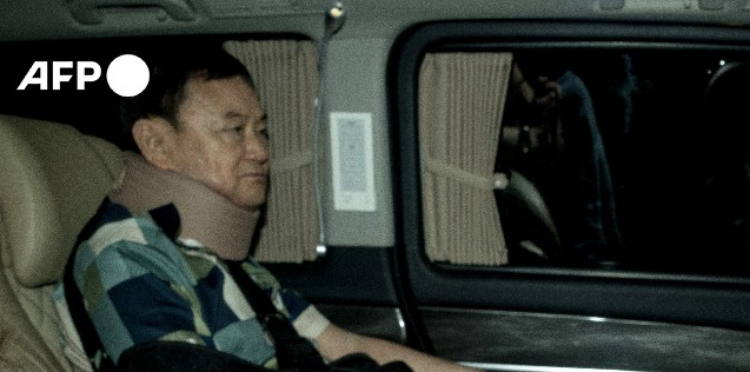
Former prime minister Thaksin Shinawatra was released on parole early yesterday morning, and today he appeared at the Office of the Attorney General to answer charges of lèse-majesté that were first filed in 2016. He was released on 500,000 baht bail, and the Attorney General will announce on 10th April whether he will be indicted.
The lèse-majesté case stems from an interview Thaksin gave on 21st May 2015 to The Chosun Daily (조선일보), a South Korean newspaper, during which he implied that a “palace circle” was behind the 2014 coup. The Chosun Daily video was not the first newspaper interview that led to lèse-majesté charges against Thaksin: in a 9th November 2009 interview with The Times, when King Rama IX was still on the throne, he agreed with the interviewer that the reign of Rama IX’s successor “will be a “shining” age”. As a result, lèse-majesté charges were filed against both Thaksin and Times journalist Richard Lloyd Parry.
The lèse-majesté case stems from an interview Thaksin gave on 21st May 2015 to The Chosun Daily (조선일보), a South Korean newspaper, during which he implied that a “palace circle” was behind the 2014 coup. The Chosun Daily video was not the first newspaper interview that led to lèse-majesté charges against Thaksin: in a 9th November 2009 interview with The Times, when King Rama IX was still on the throne, he agreed with the interviewer that the reign of Rama IX’s successor “will be a “shining” age”. As a result, lèse-majesté charges were filed against both Thaksin and Times journalist Richard Lloyd Parry.

When Thaksin was driven home from the police hospital after his parole, he was photographed wearing a neck brace, and with his right arm in a sling. After meeting him at the OAG this morning, Preecha Sudsanguan described the former PM’s health condition: “He came to see us in a wheelchair,” the director general of the criminal litigation department said. “His voice was barely audible when I talked to him and he looked critically ill to me.”
Suspicions were raised about Thaksin’s health when he was transferred to a police hospital on the very first night of his prison sentence, despite being well enough to fly back to Thailand that same morning. He remained in hospital for the entire duration of his sentence, yet after being paroled, he was sent home, apparently no longer needing to be hospitalised. Yet according to the OAG, his condition now appears even worse, despite his six-month hospital stay.
Suspicions were raised about Thaksin’s health when he was transferred to a police hospital on the very first night of his prison sentence, despite being well enough to fly back to Thailand that same morning. He remained in hospital for the entire duration of his sentence, yet after being paroled, he was sent home, apparently no longer needing to be hospitalised. Yet according to the OAG, his condition now appears even worse, despite his six-month hospital stay.
